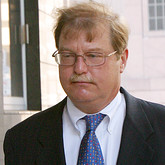 In this previous post on former Enron CEO Jeff Skilling’s Supplemental Brief regarding prosecutorial misconduct in connection with covering up exculpatory evidence contained former Enron CFO Andrew Fastow’s interview notes, I noted that the Skilling brief would likely have a ripple effect on the re-trial of three former Merrill Lynch executives in connection with the Enron-related criminal case known as the Nigerian Barge case.
In this previous post on former Enron CEO Jeff Skilling’s Supplemental Brief regarding prosecutorial misconduct in connection with covering up exculpatory evidence contained former Enron CFO Andrew Fastow’s interview notes, I noted that the Skilling brief would likely have a ripple effect on the re-trial of three former Merrill Lynch executives in connection with the Enron-related criminal case known as the Nigerian Barge case.
Well, based on an extraordinary motion filed on behalf of former Merrill executive James Brown, that ripple effect has turned into a tsunami of evidence that includes, but is not limited to, the Fastow interview notes.
As with the Lay-Skilling case, the Nigerian Barge case has long represented much of what is wrong with the Department of Justice’s regulation of business-through-criminalization approach in the post-Enron era.
After prosecuting Arthur Andersen out of business in the intensely anti-business, post-Enron climate, the Enron Task Force threatened to do the same to Merrill Lynch unless the firm served up some sacrificial lambs, which it did with Mr. Brown, Daniel Bayly, Robert Furst and William Fuhs.
Through a deferred prosecution agreement with Merrill, the Task Force then proceeded to hamstring the defendants’ defense by limiting access to other Merrill Lynch executives involved in the barge transaction. Moreover, the Task Force intimidated other potentially exculpatory witnesses by threatening to indict them if they cooperated with the defense.
After bludgeoning a couple of plea deals from former key witnesses Ben Glisan and Michael Kopper, the Task Force proceeded to put on a paper-thin case against the defendants, which was good enough to obtain convictions in the hyper-anti-Enron climate of Houston in 2004.
Of course, most of the convictions were vacated on appeal (and in Fuhs’ case, reversed and rendered), but not before each of the former Merrill defendants and their families had incurred the incalculable human cost of these misguided prosecutions.
Now, Brown’s motion provides a specific and detailed case that the Enron Task Force engaged in not only a wide-ranging cover-up of evidence that was exculpatory to the Merrill defendants, but also offered testimony at trial that the Task Force lawyers knew was contradicted by evidence and testimony that they had in their possession.
The lives and careers that have been damaged in the Nigerian Barge case are the inevitable carnage that results from giving incentivized prosecutors the overwhelming power of government to paint transactions as frauds and manipulate ignorance about them as a means to regulate merely questionable business transactions. A truly civil society would find a better way.
Update: As usual, Ellen Podgor asks the key question — why are the Fastow notes so late in coming?
Update 2: The Chronicle’s Kristen Hays has an article on the Brown motion here.

This case and the case of Jeff Skilling undermine the very foundation of the rule of law. Simply vacating these bogus convictions is not enough – there must be a price paid by the four prosecutors in this case – Weissmann, Ruemmler, Hemann, and Friedrich – and the price must be heavy enough to deter future prosecutors from breaking the law. The court should refer this matter to the state bar association and their law licenses should be revoked.
This is serious stuff and should not be tolerated by the court or the bar. Disbarment will perhaps get their attention and those of their ilk.
The following comment was sent to me via email from Dr. Battle Haslam:
Due process is, well, due. Assuming the allegations in the grievances are confirmed for Skilling and the Merrill Lynch defendants, then disbarment is the appropriate response if “judicial ethics” is not an oxymoron. Unfortunately, there are available too many examples of USDOJ prosecutorial overreach and misconduct, suggesting that earlier reproaches have been no deterrent. Circuit courts have at times considered “dismissal with prejudice” an adequate rebuke. It is not. That’s analagous to missing a foul shot. The DOJ lawyers can defend themselves with the US taxpayers’ deep pockets, then “survive” to perpetrate on future defendants the massive expenses of trials, and the destructive effects of imprisonment. The looming question: on DOJ’s major masthead, what supervisor was asleep at the switch – or (worse) turned a blind eye?
Wow, take a look at this article about John Kroger:
http://wweek.com/editorial/3420/10728/
Apparently, Kroger is planning a book, to be released in May, titled Convictions: A Prosecutorís Battles Against Mafia Killers, Drug Kingpins and Enron Thieves. According to the article, Kroger has this to say about the Enron broadband indictments:
“In his book, Kroger says his initial scorched-earth approachóthreats of long prison sentences based on limited investigationówas a ìhuge mistake,î because well-educated executives were less susceptible to such tactics than professional drug dealers and Mafia killers.
ìWhen I transplanted my skills to the white-collar [crime] world, they were much less successful,î he writes. ìThe reasons for this were so obvious I should have realized it before I made a fool of myself.”
“Threats of long prison sentences based on limited investigation” — his “huge mistake” has contributed mightily to the incalculable human cost of which you have written so well.